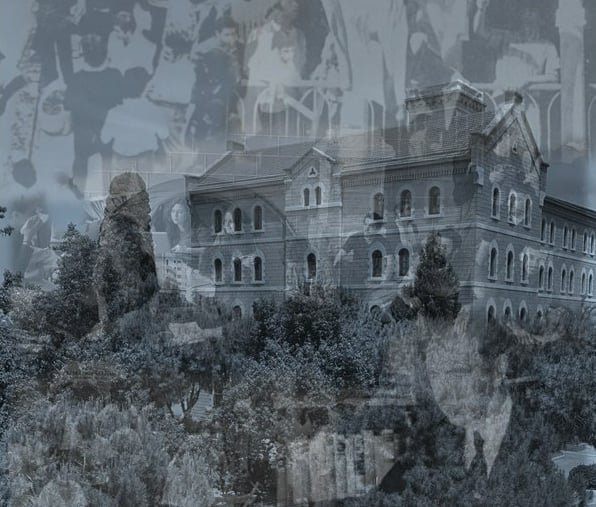Strategizing from 7 cities across the globe
Everlasting Blissful Freedom
While the American University of Beirut has been called a pro-Zionist entity, this article goes through the stances of AUB within these conflicts. As it turns out to be, AUB has never taken a firm stance and bias as an institution, but did not hesitate to encourage the right side of history
MIDDLE EASTACADEMICEDUCATIONAUBWAR
Jad Shehayeb
10/13/20244 min read


The Lewis Affair of 1882, when Edwin Lewis gave a commencement speech in which he praised Darwin’s Theory of Evolution, is factored into the very essence of the American University of Beirut (AUB). That incident is an attestation to AUB’s commitment to the academic freedom of its faculties, professors, and students regardless of their political affiliations. AUB has never dismissed or fired a faculty member or staff because of their inclinations ever since 1882.
That same academic freedom is threatened today.
On October 15, 2023, a group of barbaric men stormed Hamra’s vibrant street, Bliss, and attempted to vandalize AUB’s Main Gate by breaking parked bikes and dimming street lights. While violence in its entirety is unjustifiable, there was no solid basis for this assault but the fact that the university is American. Isolationism has been nurtured so deeply into the country’s fabric that liberal and progressive institutions like AUB are now the problem. AUB’s association with Zionism or any radical political ideology can be easily debunked by taking a brief look at the university’s history from 1882 to the creation of the State of Israel in 1948, to the rise of Arab nationalism in the 1950's, and finally, until today
As mentioned clearly in Anderson’s book, The American University of Beirut: Arab Nationalism and Liberal Education, AUB's past presidents, administrators, and staff never showed any affiliation with Israel - instead, they distanced themselves from it. In 1948, when the US government recognized the existence of Israel, AUB administrators and American professors did not relate to their government’s stance. That year, Former President Stephen Penrose strongly supported the rights of Palestinian refugees displaced due to the 1948 war. Penrose expressed sheer fretfulness when he stated, “It is unthinkable that the Christian world at least could accept as satisfactory any solution which created a greater problem than that which it was designed to solve. Yet this is what happened during the debacle of Palestine.” It was not just Penrose who showed clear support for Palestine, as his predecessor President Bayard Dodge supported the assimilation of Jewish refugees into other Arab states instead of the establishment of a Jewish state in Palestine. Pro-Arabism was never rejected at AUB; it was amplified.
When it comes to students, AUB acted as a beacon of hope, freedom, and safety where they could think, practice, and apply their political beliefs. For example, Antoun Saadeh, the founder of the Syrian Social Nationalist Party (SSNP), was an AUB graduate. The SSNP is a Lebanese party that is famous for its strong stances in support of armed resistance against Israel and its refusal of normalization. AUB has housed a diversity of ideologies and a distinguished student body which has never shied away from expressing itself.
Since the October 7 attack, AUB has been relentlessly trying to disprove false claims that have been circulating by misinformed people to paint the institution as an accomplice in the Gaza genocide or the aggressive events unfolding in Lebanon right now, however, these propagandists have failed miserably.
The AUB campus, ever since October 7, became a hub for rebellious students who had something to say but lacked a platform. AUB became their platform. While US universities were forcefully dispersing student-led encampments on their campuses and seeking the intervention of the police, AUB was sustaining a multitude of protests and marches on campus and around its outskirts where students, faculty members, and staff contributed to their civil duty of speaking out and raising awareness on the ongoing conflict in Gaza.
Current President Khoury joined a march organized by AUB students in support of war-torn Gaza and its innocent citizens wherein he gave a speech supporting the rights of Palestinians wherever they may be in the world.
Additionally, AUB’s administration listens to its student body. During the spring semester of 2024, the Issam Fares Institute at AUB wanted to invite a speaker to join a panel discussing the Gaza conflict. However, the speaker was a proud Zionist, triggering a number of students at AUB. Said students organized petitions and protests demanding the cancellation of this talk, ultimately reaching their goal.
In the West Bank, Gaza, Iran, and all around the world, citizens long for freedom, everlasting blissful freedom. Likewise, the Lebanese people and with them, AUB students, are caught in the crossfire of a war that their parliament never voted for. They are facing Israel’s fanatic war doctrine while being oppressed by a foreign entity that praises resistance but practices isolationism, claims liberation while violently suppressing peaceful protests using live ammunition, calls for peace while constantly triggering regional wars, and pretends to advance education while it demonizes the biggest learning hub in the Middle East.
In 1991, College Hall, AUB’s face, was bombed as part of propaganda to frame the university as a strange body foreign to Lebanese ground, but the truth of the matter is simple: AUB is rooted in Beirut just as much as Beirut is rooted in AUB.
AUB's identity as an American University has never induced the adoption of a pro-Zionist agenda. With its community, it stands on the right side of history - one that supports the sovereignty of Lebanon and Palestine.
References
American University of Beirut. Darwin and the Crisis of 1882 in the Medical Department. (n.d.). https://www.aub.edu.lb/aubpress/pages/darwin.aspx#:~:text=When%20Professor%20Edwin%20Lewis%20mentioned,a%20Declaration%20of%20Principles%20o
Anderson, B. S. (n.d.). The American University of Beirut: Arab Nationalism and Liberal Education. The American University of Beirut: Arab nationalism and liberal education on JSTOR. https://www.jstor.org/stable/10.7560/726918
